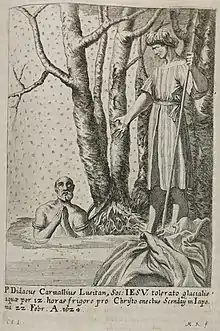Diogo Carvalho | |
|---|---|
Diogo de Carvalho | |
 | |
| Personal | |
| Born | 1578 |
| Died | 22 February 1624 (aged 45–46) |
| Cause of death | Martyred (icy waters) |
| Religion | Christianity |
| Parents |
|
| Denomination | Roman Catholicism |
| Order | Jesuit |
| Senior posting | |
| Ordination | 1608 |
| Website | www |
Diogo de Carvalho, SJ (1578 – 22 February 1624) was a Portuguese Jesuit missionary martyred in Edo period Japan.
Biography
Carvalho was born in Coimbra, Portugal, in 1578. After entering the Society of Jesus in his hometown in 1594, late in 1600 he arrived, after a long voyage with sixteen other Jesuits, in Goa, India. The following year he set out for Macau, where he was ordained as priest in 1608. In 1609, he arrived in Japan, where, learning Japanese, he was a missionary in the Amakusa Islands, before relocating to Kyōto around 1612. After the edict of proscription of 1614, in November that year, with seventy-two other Jesuits on three Chinese junks, he was deported to Macau. Establishing a mission in Cochinchina, he remained in Vietnam for a year, before secretly returning to Japan in 1616. He spent two years in the Ōmura Domain in the area of Nagasaki, before joining Jerome de Angelis in Tōhoku, with the alias Nagasaki Goroemon as his cover. Basing himself in the fief of Gotō Juan (後藤寿庵), he twice travelled to the Matsumae Domain in Ezo, while Matsumae Kinhiro was daimyō, first in 1620, then again in 1622. Early in 1624, he was martyred in a pit filled with the icy waters of the Hirose River (広瀬川) in Sendai. A long letter by Carvalho detailing his encounters in Tōhoku and Hokkaidō survives.[1][2][3][4]
See also
References
- ↑ Cieslik, Hubert (2008). "Father Diego Carvalho (1578–624), a Sendai Martyr" (PDF). The Jesuits of Japan.
- ↑ Rochford, Tom. "Blessed Diogo Carvalho". Society of Jesus. Retrieved 28 July 2020.
- ↑ Abe Takao (2005). "The Seventeenth Century Jesuit Mission Reports on Hokkaido". Journal of Asian History. Harrassowitz Verlag. 39 (2): 111–128. JSTOR 41933412.
- ↑ Cieslik, Hubert (1962). 北方探検記 [Chronicles of the Northern Missions] (in Japanese). Yoshikawa Kōbunkan.